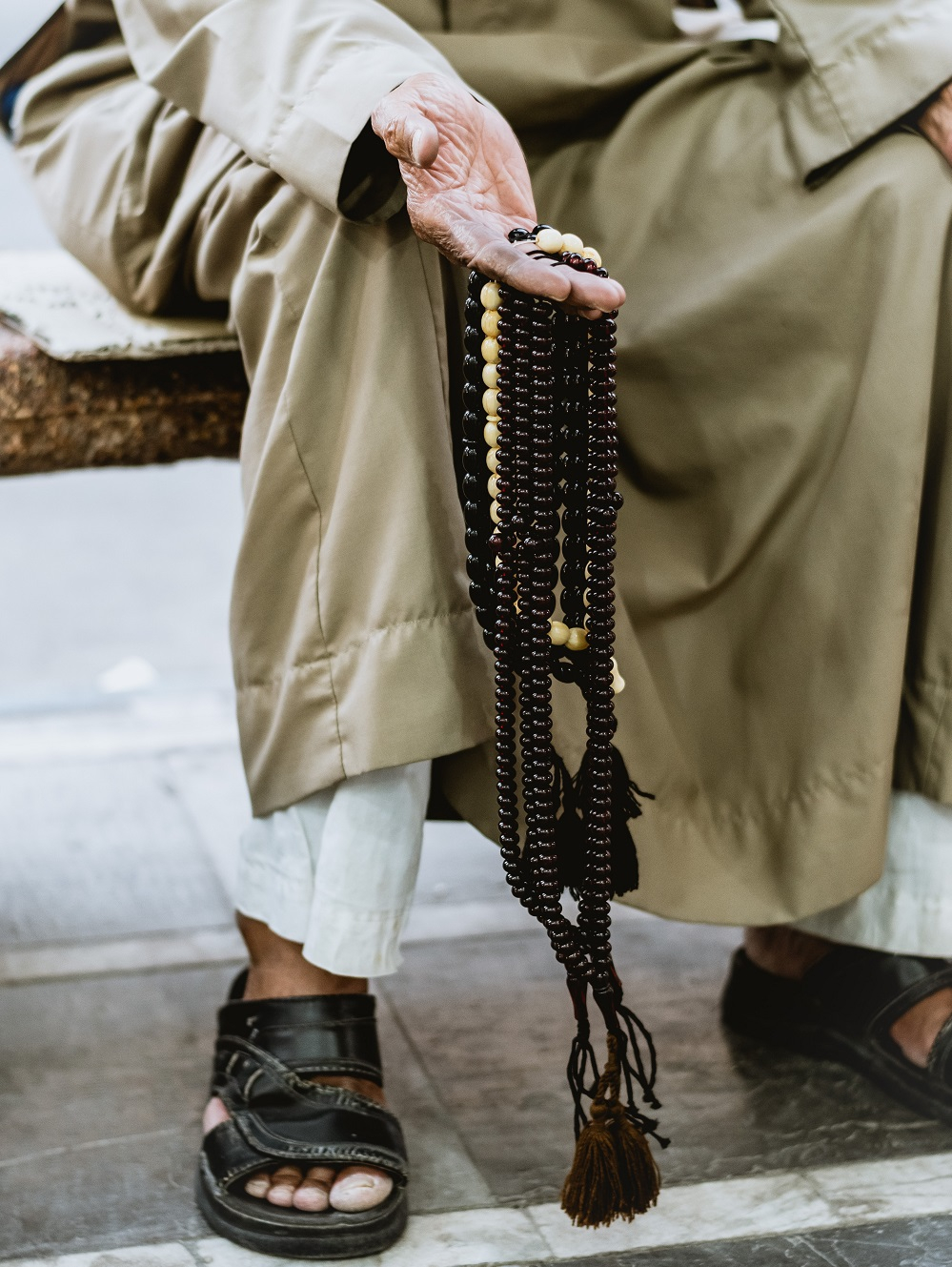It's Ok to Nurse Your Grief. The Prophet Muhammad (saw) Grieved, Too
Faith
|
Dec 29, 2020
|
7 MIN READ

Photo by Ikhsan Sugiarto on Unsplash
It’s often hard, amid a year that was so difficult for many of us, to gain perspective and draw lessons by reflecting on the sorrows and challenges others endured. It’s hard to look beyond ourselves, to contemplate what others have gone through to help us come to terms with what we are going through.
But as we near the end of an extremely challenging year, I want to reflect on the concept of calamity and sadness through a religious lens. Allah (S) tells us in the Quran, “And We will surely test you with something of fear and hunger and a loss of wealth and lives and fruits, but give good tidings to the patient.” [2:155]
This concept is not foreign to us. We have read about it in our Islamic history books, nations and tribes before us have always been afflicted in order to test their faith. Most importantly, we are constantly reminded in the Quran and seerah that the Prophets and Messengers themselves have gone through their fair share of trials and tribulations. If the most noble humans to have walked this Earth have been tested, we as the followers and servants of Allah (S) will surely be tested as well, as 2020 has shown us.
What I love most about the Quran is that it never leaves us hanging. Allah (S) in the next verse tells us exactly what we need to do in order to be of those who will be given good tidings. Along with being patient He states, “Who, when disaster strikes them, says, ‘Indeed we belong to Allah,’ and indeed to Him we will return." [2:156]
Our own Prophet Muhammad (saw), the most beloved to Allah (S), was tested many times in his life, particularly in one year that He referred to as “The Year of Sorrow.” He struggled on a personal and community level, which is something that really resonated with me. There is much to learn from how he managed his sorrow and grief. Insha’Allah we can learn from his unshakeable faith and humanity and implement it into our own lives in the coming year..
Join me in a little Islamic history and reflection.

Image source: "Cross the Sahara Desert"
The Boycott of the Prophet Muhammad (saw)
During the 10th year of his dawah, two and a half years prior to the Hijrah of the Prophet to Madinah, the clan of Banu Hashim, from which the Prophet Muhammad (saw) traces his lineage, took on a self imposed exile due to an economic boycott the leading tribe of The Quraysh imposed in Makkah. This was in direct response to Muhammad’s (saw) message and calling to the oneness of Allah (S).
Imagine how difficult that was for the early believers of Islam: an economic shut down that directly affected their ability to support themselves. The Quraysh ordered its people and all of the surrounding tribes to not do business with the Prophet and his followers, to not marry into the Banu Hashim tribe, to shut them out completely.
Outside of his home, the Prophet had one person who was his ally and protector against the Quraysh, his dear uncle Abu Talib (who never converted to Islam and was head of the Banu Hashim clan). In response to the boycott, Abu Talib ordered the Banu Hashim to leave Makkah. They lived in valleys on the outskirts of Makkah. By the will of Allah (S) they persevered and got through this difficult time and were able to return back to Makkah after some Quraysh members sympathized with them and arranged an end to the boycott.
Following this difficult incident, the Prophet Muhammad (saw) endured two huge losses in the span of two months. For this reason, he called it “The Year of Sorrow.” Many of us can sympathize with our beloved Muhammad (saw) by looking back at how the global pandemic wreaked havoc at the beginning of the year followed by many personal losses and difficulties for so many of us.
We have faced loss of income, academic and work challenges, months of sheltering-in-place, devastating illnesses, death and more. Many of our masajid are shut down, Juma'uh (Friday) prayers limited and Hajj severely curtailed. It is as though the verse is unfolding in front of our very eyes as a wakeup call to our Ummah.
The Quran and it’s verses are timeless. They were sent down to the Prophet Muhammad (saw) but apply to Muslims regardless of era and location.
The Death of Abu Talib
Losing a loved one is one of the most life changing, heart wrenching and traumatic experiences you will ever experience. Losing the one person on Earth who was your protector against an enemy makes this death an ever bigger tragedy. When the Prophet lost his uncle, Abu Talib, he was instantly stripped of his security in Makkah. His love for his uncle was so deep that even though Abu Talib refused to say his shahada before taking his last breath, it was narrated that Muhammad (saw) said "I will keep on asking Allah's forgiveness for you unless I am forbidden (by Allah) to do so.”
This is a testament to the humanity of the Prophet (saw), to his emotions that overcame him in his time of grief. By His divine mercy and eloquence of the Quran, Allah (S) sent down verse 113 in Surah Al-Tawbah as a gentle reminder to the Prophet (saw) that it wasn’t suitable for him or any believer to ask Allah (S) for the forgiveness of those who have decided to disbelieve in the Oneness of Allah (S) (perform shirk). Allah (S) also reminds us and the Prophet Muhammad (saw) in another verse that “Indeed, [O Muḥammad], you do not guide whom you like, but Allah guides whom He wills. And He is most knowing of the [rightly] guided.” [28:56]

Photo by Ashkan Forouzani on Unsplash
There are so many of us out there who can relate to this moment and the feeling our dear Muhammad (saw) must have felt as he held his hands up in desperation, begging Allah (S) to pardon his beloved uncle. How many of us have family members, perhaps our own parents, grandparents, aunts and uncles whom we love dearly but are not Muslim?
Despite our efforts to soften their hearts and invite them to Islam, there comes a time when we must submit, just as the Prophet (saw) did, to the will of Allah (S) and accept that only He has the power to guide whom He wills to the straight path. And in that there is wisdom; we may not understand, we were not meant to understand everything in His divine decree or what will happen.
The Death of Khadijah (raa)
Within 40 days of the death of Abu Talib, on the 10th of Ramadan our beloved Khadijah (raa), the first wife of the Prophet Muhammad (saw), passed away. There are written volumes and endless hours of lectures on the significance of Khadijah (raa). She was the Prophet’s biggest support system in every sense of the word. She was the first to accept Islam, and the Prophet’s love for her was so deep that he described her as “the best amongst the women.”
At the time of her death, the obligation of prayer had not yet been ordained by Allah (S). In lieu of prayer, Prophet Muhammad (saw) did what was known practice and took charge of her burial and placed her in the grave. There are reports that the sahabah, companions of the Prophet, said that after the death of Khadijah, the Prophet (saw) did not smile for months. His sorrow and grief was so deep.
Going from an economic boycott to the loss of his uncle and external protector against his enemies was hard enough. And now the loss of his beloved wife, first love and companion and protector inside the home hit him hard – all within the span of two months. I speak for myself first when I say that we can oftentimes forget that the Prophet Muhamad (saw) was as human as we are, albeit he was the best of mankind. He was not a divine being, he was in fact human in every sense of the word and felt pain, sorrow, grief, hardship and all of the other emotions you and I feel.
Reflecting on the unfortunate series of events that unfolded in The Year of Sorrow has helped me find a more intimate connection with the Prophet; he endured so many of the same emotions I felt this year. Reflecting on my personal struggles in 2020 and his struggles in The Year of Sorrow has helped me stay grounded in my faith and the will of Allah (S). Surely the trials of the Prophet were drastically different than mine, but we share the same human feelings of grief, sorrow and loss.
This solidarity in grief with the Prophet Muhammad (saw) gives me comfort and ease in knowing that “Verily with hardship there is relief.” [94:6], and just as the Prophet persevered through his loss and pain in order to get to his ultimate reward (Jannah), I too shall dig deep to find the strength to carry on by the grace of Allah (S). To keep my eye on the prize and acknowledge that this life is temporary, and what awaits those who believe and have patience is eternal bliss.
May Allah (S) help us all reach our ultimate goal of entering Jannah by showering us in patience when we are hit with calamity. May we all accompany the Prophets and Messengers in the highest levels of Jannah for enduring hardship with a heart steadfast in Iman and the qadar of Allah (S). Ameen.
Subscribe to be the first to know about new product releases, styling ideas and more.
What products are you interested in?

